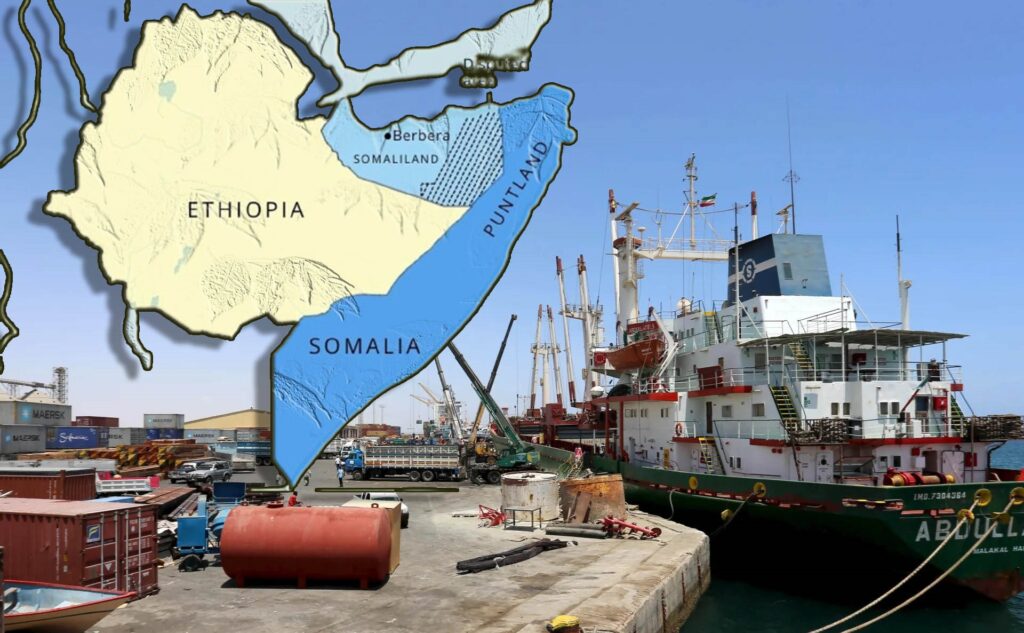
- The Berbera port deal places Somaliland in legal limbo, likely joining de facto states without international recognition.
- Mogadishu’s weak position suggests that maintaining stability and economic growth is crucial for Somaliland’s future autonomy.
- The rise in nationalism could be leveraged by Somalia to address internal challenges, break extremist influences, and pave the way for economic recovery.
Ethiopia, with a staggering population of 120 million, faces unique economic challenges as the largest landlocked country globally. The absence of direct sea access necessitates robust transportation infrastructure and global market connections for economic growth. Recently, Ethiopia entered into the Berbera Corridor project, involving Somaliland and the UAE. The deal sparked controversy and could potentially reshape the geopolitical landscape in the Horn and Red Sea region.
The Berbera Corridor Project: A Complex Deal
The Berbera Corridor project involves Ethiopia gaining access to the port of Berbera and acquiring land for a naval base in return for Somaliland obtaining a share in Ethiopian Airlines. This move has raised eyebrows and could lead to Ethiopia officially recognizing Somaliland as a separate nation. However, internal opposition in Somaliland, including the resignation of the defence minister, highlights the controversy surrounding the deal, especially with upcoming elections.
Somalia’s Response: Historical and Global Concerns
Somalia’s reaction to the deal is multifaceted. Historical tensions, particularly the Ogaden War in 1977, contributed to Somalia’s reluctance to accept Ethiopian recognition of Somaliland. There are concerns about a potential global ripple effect, with countries like Kenya and the UAE likely to follow Ethiopia in recognizing Somaliland. This, in turn, could impact regional alliances and influence in the Horn and Red Sea regions.
Diplomatic Fallout and Regional Dynamics
Diplomatically, the deal has stirred reactions from neighbouring countries. Egypt supports Somalia’s territorial integrity, while Eritrea and Djibouti express concerns, the latter risking a significant source of income from port usage fees. Ethiopia’s diplomatic influence will be put to the test, with potential leverage for Somalia from geopolitical rivals in the broader region.
Somalia’s Limited Options: Diplomatic and Military Challenges
Somalia finds itself in a challenging position with limited diplomatic strength in African groups and insufficient military power to force negotiations. While statements support Somalia’s borders, preventing the deal appears unlikely. Ethiopia’s military presence in Somalia further complicates matters, with potential repercussions if troops are withdrawn.
Comparative Perspective: Somaliland in Global Context
Analyzing Somaliland’s situation in a global context, historical examples of secession reveal that international recognition often depends on the consent of the state from which secession occurs. Eritrea and South Sudan succeeded with such consent, unlike cases where claims lacked support among affected populations, as seen in Kenya.
Fractured Colonial Pasts: A Comparative Analysis
Examining historical cases, instances of territorial threats in Kenya and secession attempts in Ghana and Cameroon underscore the role of state coercive capacity in preventing insurgencies. Successful secession, as observed in Eritrea and South Sudan, often involves administrative separateness and the consent of the former capital.
Somaliland’s Unique Path: Economic Factors and Political Stability
Somaliland’s post-1991 achievements stand out, maintaining peace and cultivating democratic governance. Economic factors, such as reliance on animal exports and the absence of arable land disputes, contributed to its stability. Unlike southern Somalia, internal cooperation and remittances supported Somaliland’s path to autonomy.
Conclusion: Somaliland’s Future Amidst Geopolitical Shifts
The Berbera port deal places Somaliland in legal limbo, likely joining de facto states without international recognition. Mogadishu’s weak position suggests that maintaining stability and economic growth is crucial for Somaliland’s future autonomy. The rise in nationalism could be leveraged by Somalia to address internal challenges, break extremist influences, and pave the way for economic recovery.
In a complex geopolitical landscape, the Somaliland question remains intertwined with historical grievances, regional dynamics, and the delicate balance of power in the Horn of Africa.
(Srijan Kumar is currently pursuing a PhD in South Asian studies from Delhi University. He is a writer and a columnist for various digital media houses. Opinions expressed are the author’s own)
